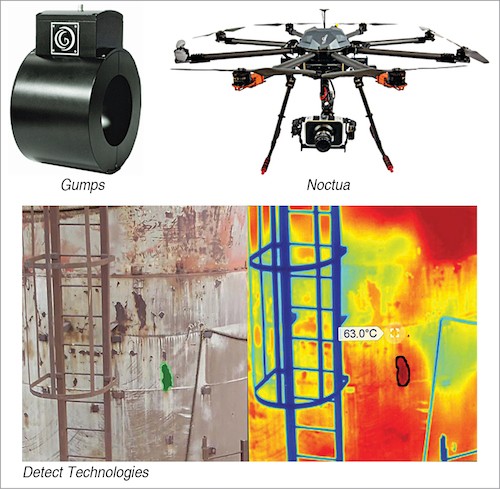Machinery and structures like pipelines, stacks, chimneys, and tanks used in several industries need regular monitoring and inspection to ensure reliability and accuracy in results. When done manually, this can be a tedious, risky and expensive task. This becomes especially challenging when the structures are at high temperatures. IIT Madras incubated startup Detect Technologies was founded in 2016 to automate such inspection processes through their suite of patented products such as Gumps (Guided Ultrasonic Monitoring Pipelines System), Noctua, T-pulse and Apis.
Their flagship product, Gumps, is a high-temperature (up to 300 degrees celsius), real-time intelligent sensor for industries that need continuous pipeline health and integrity monitoring to avoid potentially hazardous leaks. An ultrasonic pulse receiver unit processes the data, which is then consolidated for transfer to cloud storage. The system is capable of detecting and sending automatic alerts for corrosion and defects at any point of the pipeline network using fault detection software for a range of up to several meters from a fixed point. This is also useful in constructing 3D models of pipelines for a holistic view.
Reports generated through the software can be customised for different users. Its first trial installation was done in Reliance, Jamnagar in March 2016.
The fully-automated, intelligent drone, Noctua comes with a thermal camera installed for utilising the captured aerial photos and videos to inspect several assets like columns, vessels, and reactors that vary in size and location (indoors or outdoors). Its positioning system and computer vision algorithms make it capable of doing a programmed flight even in challenging indoor environments. Ultra-Wideband (UWB) technology helps to achieve this accuracy up to 150 metres under line-of-sight (LOS) conditions, thereby minimising human error. Cloud report system generates inspection reports to help users make correct decisions. Integrating with GIS for asset mapping helps to effectively identify, analyze, store and display geographic data from different sources and build relationships between them. In November 2016, the drone was used for its first flight stack inspection in Tata Steel, Jamshedpur.

These products leverage sensor technology, drone technology, image processing, and machine learning algorithms with an aim to ease decision-making by providing real-time monitoring and inspection for even those assets that are usually difficult to access. The startup raised its funding from various investors such as SAIF Partners, Bharat Innovation Fund, Axilor Ventures, BlueHill Capital Pvt Ltd and a few angels from the Keiretsu Forum.
In March 2019, Noctua did its first international inspection in Oman. The startup was also among the winners of the 2019 edition of the Qualcomm Design in India Challenge. Some prominent customers of the startup include Indian Oil, Aditya Birla Group, Vedanta, Accenture, Thermal Power Group, and Bharat Petroleum. Having expanded to the US already, the company is currently focusing on further international expansion.









